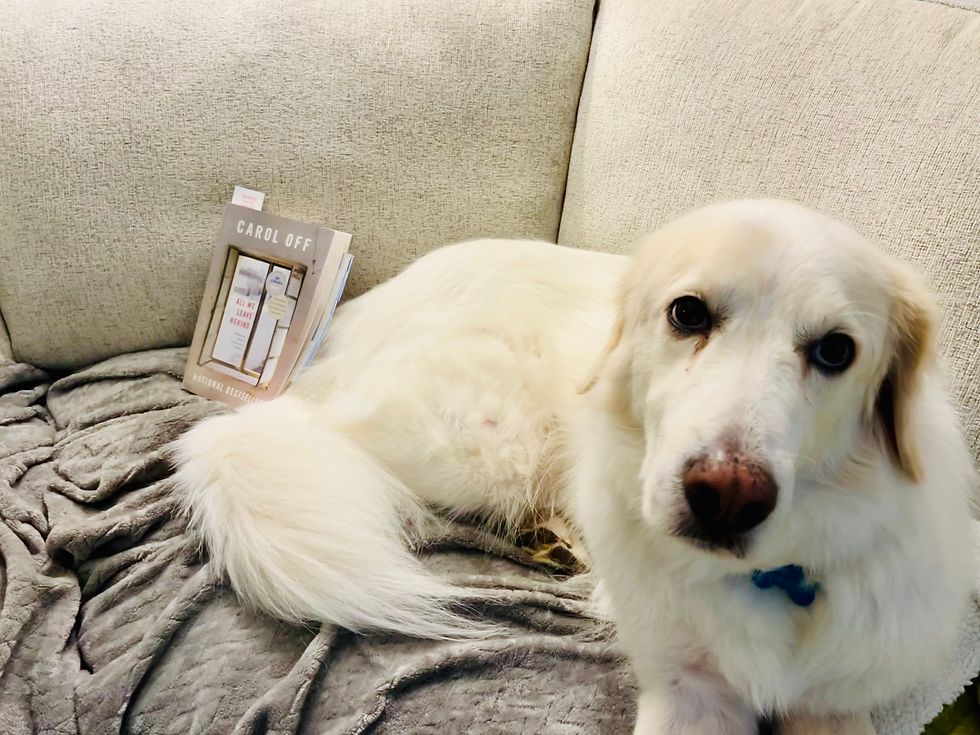All We Leave Behind
- Angie

- Oct 20, 2025
- 4 min read
This week I will have the honour of introducing Carol Off, the keynote speaker at a conference I am organizing. Carol is a multi-award-winning journalist, author, and broadcaster. As a veteran CBC journalist and longtime host of As It Happens, Carol has spent her career reporting on the very forces shaping and challenging democracy and citizenship today. In order to prepare for this introductory speech I decided to read one of her books. She recently published a new book, At A Loss For Words, but I was drawn to the story in All We Leave Behind and decided to read that one first. Now that I've read it, I know I will definitely be buying a copy of her newest book soon.

All We Leave Behind explores her time covering a story on warlords in Afghanistan in the early 2000s and the impact she had on the life of one of her subjects, a connection that would be maintained and solidified for over a decade. We meet Asad Aryubwal as he tells his story to Off and her crew, exposing tyranny and painting a picture of life in a dictatorship. He is putting himself at a great risk but wants to tell his story. Unfortunately, Off didn't realize quite how big of a risk he was taking. For the next several years Asad and his family are in great danger and on a subsequent visit Carol learns just how much danger they are in and pledges to help them immigrate to Canada. She had no idea what a difficult process this would be, but she was committed, she felt she had been the one to get Asad into this mess (through her documentary), she hoped her skills and connections as a journalist could help get him out (literally). I could not put the book down as she detailed this difficult process, and I really learned a lot about the politics and bureaucracy that goes into helping vulnerable people find safety in the country I love.

My book (which I hope to get Carol to sign Friday) is filled with post it notes and I copied the interesting ideas down in a word document to look back on. A lot of them were surprising facts or information, for example, the fact that the majority of the 2 million Afghans in Pakistan in the mid 00s were actually born there - the children and grand children of refugees who escaped Afghanistan in the 30 years before (p. 189). I learned a lot about the causes of the problems in Afghanistan at the time, something that as a preteen during 9/11 I really did not have a good grasp of and never did feel fully caught up (I still have a lot to learn). I also learned about the messaging around the military missions in the 2000s and the refugee crisis of the early to mid 2010s. I also learned so much about the refugee application process and the seemingly endless hoops these people must jump through to prove they need safety. As I was reading I said to my husband "the man in this story has a heart condition which is exacerbated by the lack of exercise and high anxiety around leaving the house, caused by the constant violence outside his door. Gee, I wonder why he needs to move somewhere safe?" I feel like "It is literally not safe to leave my house" should probably be enough to prove you need safety but what do I know?
This book taught me a lot, but it also left me with a need for more information and answers to my questions - as I said, I still have a lot to learn. I'm most intrigued by the refugee process and want to learn more about it, both in Afghanistan and other countries. I also want to learn more about the Taliban and how it came to be. I've read Prisoner of Tehran by Marina Nemat and I Am Malala by Malala Yousafzai, but some of the things that Carol mentioned left me wanting to know more. She mentioned how the Taliban takeover was described as a student upraising because they were students before they joined the war and that the schools were essential for the indoctrination, coupled with the extreme interpretation of Islamic law and the men's experience with women and girls being unseen led to these harsh laws. I'm also interested in learning more about the real reason Canada went to Afghanistan. As a young teen I remember being told "The US is at war with Iraq, but Canada is a peace keeping country, we are helping in Afghanistan". This led to mild confusion when I found out we were pulling the troops in the 2010s, young adult me wondered: "is Afghanistan peaceful on their own now?"

So I learned a lot, I cannot wait to hear this woman speak and read more of her writing, and I have lots more to learn going forward. All a sign of a great book, if I do say so myself! Would I recommend it? Absolutely. Once you get into it, it will be impossible to put down!


Comments